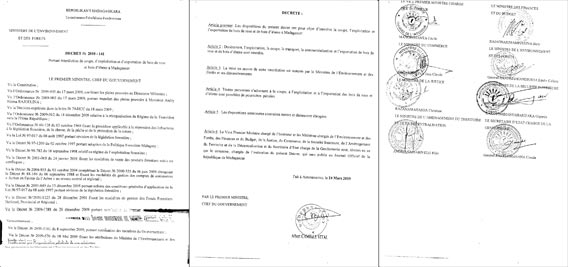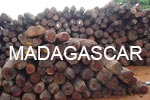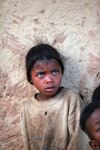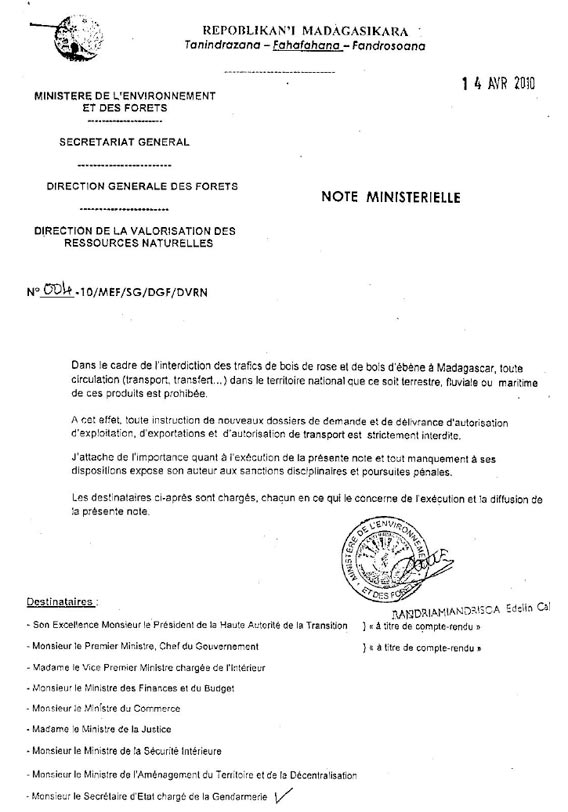Madagascar’s transitional government has finally signed a decree banning the logging and trade of precious hardwoods, a month after announcing the moratorium.
The decree comes in direct response to mounting pressure from the international community over ongoing destruction of Madagascar’s national parks by illegal loggers. Timber trafficking was associated with an increase in commercial poaching of wildlife — including endangered lemurs ̬ and violence against conservation workers and local communities by marauding bands of loggers.
The decree specifically prohibits the “cutting, exploitation and export of rosewood and ebony in Madagascar.”
The document states that “All persons engaged in the cutting, exploitation and export and rosewood and ebony are liable to criminal prosecution.”
The decree is signed by the the Deputy Prime Minister, Albert Camille Vital, and the Ministers of the Environment and Forests, Finance and Budget, Justice, Commerce, Interior Security, and the Secretary of State in charge of the Gendarmerie.
While the moratorium has been welcomed by environmentalists, some remain skeptical that it will be enforced by the current government. Some prominent advisers to the administration— which seized power during a military coup a year ago — have been linked to the timber trade.

Full size image |
PDF |
PDF-OCR
Film on the silky sifaka and rosewood logging in Madagascar. Aired last week on South African Television.
Part 1:
http://beta.mnet.co.za/mnetvideo/browseVideo.aspx?vid=25569
Part 2:
http://beta.mnet.co.za/mnetvideo/browseVideo.aspx?vid=25570
Related articles
New timber ban failing to stop illegal logging in Madagascar
(04/04/2010) Rainforest timber continues to be cut illegally from Madagascar’s national parks despite a recently announced moratorium on precious wood exports and logging, reports a source from the Indian Ocean island nation.
Madagascar bans rainforest timber exports following global outcry

(03/25/2010) Under mounting pressure over illegal logging of its national parks, Madagascar’s transitional government on Wednesday reinstated a ban on rosewood logging and exports. The decree (no. 2010-141), which prohibits all exports of rosewood and precious timber for two to five years, was announced during a council meeting held yesterday at Ambohitsorohitra Palace in Antananarivo, Madagascar’s capital city.
How to end Madagascar’s logging crisis

(02/10/2010) In the aftermath of a military coup last March, Madagascar’s rainforests have been pillaged for precious hardwoods, including rosewood and ebonies. Tens of thousands of hectares have been affected, including some of the island’s most biologically-diverse national parks: Marojejy, Masoala, and Makira. Illegal logging has also spurred the rise of a commercial bushmeat trade. Hunters are now slaughtering rare and gentle lemurs for restaurants.
Satellites being used to track illegal logging, rosewood trafficking in Madagascar

(01/28/2010) Analysts in Europe and the United States are using high resolution satellite imagery to identify and track shipments of timber illegally logged from rainforest parks in Madagascar. The images could be used to help prosecute traders involved in trafficking and put pressure on companies using rosewood from Madagascar.
Coup leaders sell out Madagascar’s forests, people

(01/27/2010) Madagascar is renowned for its biological richness. Located off the eastern coast of southern Africa and slightly larger than California, the island has an eclectic collection of plants and animals, more than 80 percent of which are found nowhere else in the world. But Madagascar’s biological bounty has been under siege for nearly a year in the aftermath of a political crisis which saw its president chased into exile at gunpoint; a collapse in its civil service, including its park management system; and evaporation of donor funds which provide half the government’s annual budget. In the absence of governance, organized gangs ransacked the island’s biological treasures, including precious hardwoods and endangered lemurs from protected rainforests, and frightened away tourists, who provide a critical economic incentive for conservation. Now, as the coup leaders take an increasingly active role in the plunder as a means to finance an upcoming election they hope will legitimize their power grab, the question becomes whether Madagascar’s once highly regarded conservation system can be restored and maintained.
